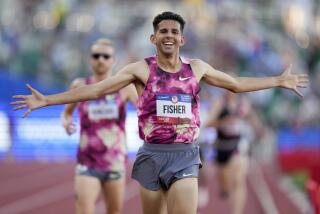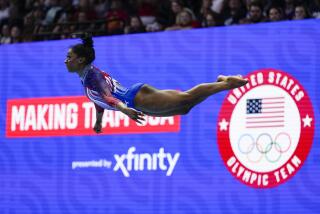At 42, Deena Kastor isn’t through with the marathon
- Share via
One way or another, Deena Kastor was determined to be part of the U.S. Olympic marathon trials Feb. 13 in Los Angeles.
The Agoura Hills High graduate and 2004 Athens Olympic marathon bronze medalist has worked with the trials host committee since L.A. was chosen nearly two years ago. At the very least, she had the option to be an especially savvy spectator at the trials, which will determine the three women to make the U.S. marathon team for the Rio de Janeiro Olympics next summer.
“I have been involved in all the meetings taking place,” she said, “and what a powerful table to sit at, of people committed to making sure this is the best Olympic marathon trials to date.”
As for running, though, she wasn’t sure.
Kastor, 42, has the fourth-best trials qualifying time, earned in October when she finished the Chicago marathon in 2 hours, 27 minutes and 47 seconds, the top American finisher there and seventh overall. She set an American women’s masters record and recorded her fastest time in six years, jumping back into consideration for the Rio team.
But Kastor, who still holds the American women’s records in the marathon and half marathon, was reluctant to commit to trying for a fourth Olympic team because she’s immersed in guiding a group of younger runners toward their dreams.
Kastor is president of the Mammoth Track Club in Mammoth Lakes, where she and her husband, Andrew, work with elite distance runners. Only recently has Kastor become inclined to compete in the trials, which would be a great gift to fans of the sport and a chance to salute a woman whose enduring career has been a beacon for American distance runners.
“I guess I’m closer to committing to doing that,” she said recently. “We have about 10 athletes here with the Mammoth Track Club and every single one of them are qualified for the trials. They’re in their 20s and this is their first Olympic trials, so I want to be at their disposal and help them prepare. I didn’t want to get self-absorbed in my own quest.”
There’s nothing wrong with a little selfishness in her case. Best of all, she found that training alongside her students triggered her own race instincts. A few weeks before her performance in Chicago, she tied the U.S. and world masters’ records in the 5K at the Rock ‘n’ Roll San Jose event, proof that by helping others she has been helping herself.
While training, she said, “My competitiveness is more of a self-competition. It’s less about beating my competitors and more about really digging down and getting the best out of myself.” Put her at the starting line, and her fire to win returns. “When I get into a competition, it seems to naturally come out,” she said.
Kastor made her first Olympic team in 2000 by winning the 10,000 at the U.S. trials, but she didn’t advance out of the qualifying heat at the Sydney Games. She moved up to the marathon, winning bronze in 2004 thanks to a smart race strategy that was perfectly executed. A broken foot forced her out of the 2008 Beijing marathon and she didn’t make the U.S. team in 2012.
Instead of retiring, Kastor threw herself into motherhood and mentoring the Mammoth Lakes group.
“It’s been an organic transition in my career,” she said. “I want to help these younger runners aspire to reach their Olympic dreams and at the same time I’m still enjoying the sport at a really high level. The pursuit of running, even in practice every day, gives me a lot of joy, and to be able to go out in competitions and meet the running community is also rewarding. Every aspect of this burden has been fun.
“I love it all, so I just feel grateful to have had such a lengthy career in this sport. It’s transitioned from a career more into a lifestyle, and I feel grateful that I can still call it my profession.”
She recently took her runners through the Olympic trials course, including the first two miles and the six-mile loop that will be repeated four times.
“I thought it was fantastic. It’s set up to be great for spectators, but it also gives the athletes a lot of time to enjoy that downtown L.A. feeling,” she said. “You pass the Staples Center and the Coliseum and go through USC’s campus, down Figueroa, so it really highlights a lot of that inner city. They did a good job at balancing serving the spectators and the athletes themselves.”
Kastor will be a winner no matter what she does Feb. 13.
Her legacy will be carried by her runners and her 4-year-old daughter, Piper, who joined Kastor and her husband on Thanksgiving for a Turkey Trot fun run. Piper doesn’t understand what her parents do, but she loves running. “She shows immense joy in doing it,” Kastor said. “That shows me we’re doing a good job of representing the sport if she can do it with a smile on her face.”
Twitter: @helenenothelen
More to Read
Go beyond the scoreboard
Get the latest on L.A.'s teams in the daily Sports Report newsletter.
You may occasionally receive promotional content from the Los Angeles Times.










